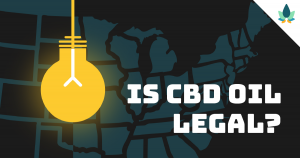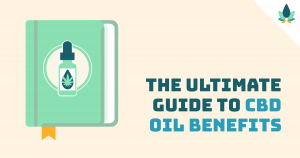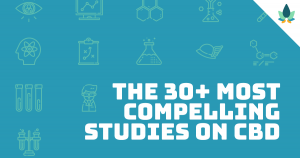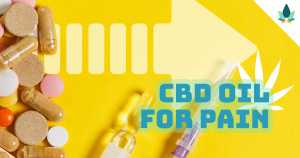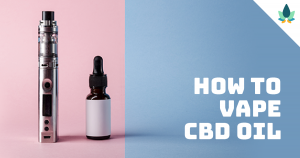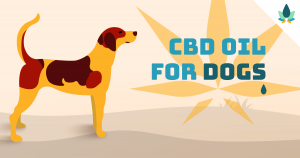So, you take CBD oil and enjoy the lack of side effects, but you have a drug test coming up for a job interview or a random check. Now you’re wondering — does CBD show up on a drug test?
The short answer: Probably not.
However, there are a few caveats to this: we’ve added a better explanation below. For example, some CBD products have more THC than others due to the purity of the product, and THC can show up on a drug test.
In this article, we reveal everything you need to know to make sure you pass that drug test as a CBD user.
But first: a disclaimer.
Drug tests are not always right on the mark. Think about traditional opioid testing. In some individuals, it is possible that the consumption of poppy seeds could create a false positive.
Similarly, THC — CBD’s counterpart with psychoactive effects — is present — naturally — in hemp plants. We will go into more detail below about the importance of consuming THC-free CBD, however, certain hemp products could create a positive THC result, especially when consumed in larger amounts.
Additionally — science is still catching up to the CBD train. It is conceivable, that even when consumed in legal quantities (under .3% THC for hemp products specifically), that an individual’s biochemistry could influence his or her ability to process and convert cannabinoids, leading to skewed testing results. If you are subject to drug testing for employment or any other reason, it is in your best interest to consult your physician before consuming any hemp products, CBD included.
Will CBD Oil Show Up On A Drug Test?
To answer this question, we have to talk about the different kinds of drug tests and what they’re looking for.
URINE TESTS
BLOOD TESTS
HAIR TESTS
SALIVA TESTS
Let’s discuss each.
Urine Tests
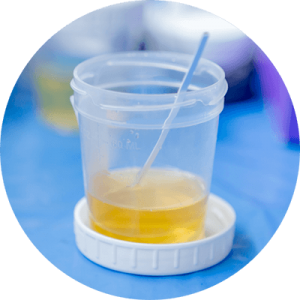
Urine drug tests, also called urinalysis, are the most common of the three types.
They’re also the least precise — drug compounds stay in your urine for only a few days to a few weeks, whereas the same compounds can be found in your hair or blood for months or even years depending on your physiological makeup, height, weight, how much body fat you have, your age, your health, your exercise patterns, and even your state of mind.
Regardless, it’s highly unlikely CBD oils will cause you to test positive for a drug screening.
Urinalysis checks urine for THC metabolites, not the specific substance itself. These tests are looking for a specific cannabinoid — THC (found in the cannabis plant) and the levels of THC which can legally only make up 0.3 percent or less of CBD isolate. (1)
So, unless you consume an abnormally large amount of CBD (over 1,000mg per day), you should be fine. Even then, it should only trigger a false-positive result due to trace amounts of THC, meaning they’ll need to re-test you. If you’re concerned, be sure to consume only THC-free CBD.
These tests aren’t screening for CBD unless they specifically order a test for CBD metabolites — which is also extremely unlikely and not part of a normal drug screen. I discuss more about CBD-specific drug tests in a section below.
Blood, Hair, & Saliva Tests
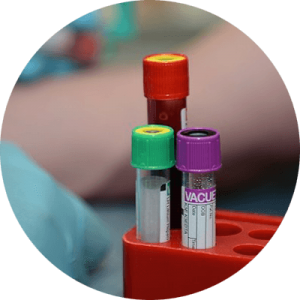
More complex job positions often use more complex drug screening methods. In this case, they could test your blood, hair, or saliva.
These tests work in the exact same way as a urinalysis — they’re looking for THC metabolites. However, they’re more accurate because, as I explained above, these metabolites stay in your blood and hair much longer than your urine.
Because they’re looking for the same thing — THC levels — it’s equally as unlikely that you’ll fail even these more accurate drug tests for using CBD oil products. Of course, if you’ve partaken in marijuana use or CBD with a high enough THC content in the last few months, that’s a different story.
Note: The U.S. federal standards for positive drug test results are designed to flag a positive on anything over 50 nanograms of THC-COOH (the metabolite for THC) per milliliter of urine. However, different employers may test for different cutoff concentrations. (2)
What If There’s Some THC In The CBD?
As we touched on above, there are no federal regulations on the quality or purity of CBD isolates. Some CBD products are very pure, as they should be. But others may contain more THC (cannabis’s psychoactive compound) than they’re otherwise legally allowed.
This is because, at the federal level, only 0.3 percent THC is allowed in CBD products. But some states have legalized medical marijuana, and in those states, it’s possible that CBD has more than the allotted 0.3 percent.
Hemp CBD oil, which is derived from the hemp plant, is the typical high-quality CBD oil that cannot contain more than 0.3 percent THC. Marijuana CBD, on the other hand, can contain much more.
| Hemp | Marijuana | |
|---|---|---|
| Is it Cannabis? | Yes | Yes |
| Chemical Makeup | Low THC (<0.3%) | High THC (5%-35%) |
| Phychoactive? | No | Yes |
| Cultivation | Requires minimal care. Adaptable to grow in most climate | Grown in carefully controlled atmosphere |
| Applications | Automobiles, body care, clothing, construction, food, plastic, etc | Medical and recreational use |
That said, if there’s a large amount of THC in your CBD oil, then you can absolutely test positive for a drug test.
Whoever you purchase your oil from should be able to tell you how much is in it — and there should theoretically be a label on the product detailing the percentage of THC. But unfortunately, lax regulations make this less trustworthy.
Always do your research on the vendor before purchasing CBD products. Make sure they’re a trustable source before you buy.
Is There A Specific CBD Drug Test?
Yes, there are CBD-specific drug screening methods.
However, these are extremely rare and mostly pointless on the employer’s end, since CBD is not psychoactive and is used for medical purposes.
The only reason a company would screen for CBD is the off chance they have an insurance provider who views CBD as a threat to insurance claims.
While this is highly unlikely, it’s still a good idea to read your company’s drug testing policies to know whether or not such a test is used.
Is CBD Oil Legal?
Yes, unlike marijuana (which is only legal in 18 states), CBD is legal in all 50 states.


Even if you are screened for CBD and caught, there’s no legal action that can be taken against you. Of course, if CBD is against the company’s policies, then that may be grounds to fire you. That’s why we recommend reading those policies, just in case.
How Long Does CBD Stay In Your System?
We’ve talked considerably about various drug tests, the length of time marijuana stays in your system and other important topics. But, even if you’re in the clear you might still be curious: how long does CBD stay in your system, anyway? Is it affected by taking it on an empty stomach? Does the “strain” of hemp plant the cannabidiol is extracted from matter? What should you know?
To answer the questions above, no — the length of time CBD stays in your system is unaffected by whether you take it on an empty stomach or not, nor the strain of hemp. The concentration of cannabidiol does matter, however, along with the amount you take and how you take it — orally, by vaping, etc.
One this is absolutely worth noting: according to research and resulting math, CBD does not stay in your system for more than a week’s amount of time. (3)
Because it does not create the same tetrahydrocannabinol, or THC metabolites (what shows up on drug tests) as “positive,” even for trace amounts of THC, which is why no CBD shows up on standard drug tests, it leaves your system earlier.
What does affect how long CBD stays in your system, is your frequency of use, your mode of delivery (tinctures, vaping, etc), and, perhaps most importantly, your own body chemistry.
Your body weight and metabolism — which vary from one person to another — are the biggest indicators of how long you can expect it to stay in your system.
Half-Life of CBD
Research is still ongoing. However, the half-life of CBD (even in high doses) is currently estimated to be around 1-2 days when taken orally — like through a tincture or edible.
On average, after around 2-4 days, the only ¼ of it would remain in your system.
By 3-6 days after consumption, it would be metabolized by your body, regardless of the variables mentioned above. Remember, though: not all CBD is created equally.
An isolate would be less likely to contain cannabinoids that could trigger a positive drug test, whereas a full-spectrum CBD product might take longer to metabolize based on the other cannabinoids that might be present.
The Bottom Line: You’re Probably Fine
CBD is very unlikely to cause you to fail a drug test. There are normally such tiny trace amounts of THC in pure CBD products (0.3 percent or less), that at worst you could get a false positive, which would simply mean a re-testing.
However, read your company’s policies to ensure they won’t be using a CBD-specific test, just to be safe. And make sure you’re buying only pure CBD oils — do your research before buying CBD from any merchant.
Want to learn more about CBD and its uses? Click here to read about the history of CBD.



